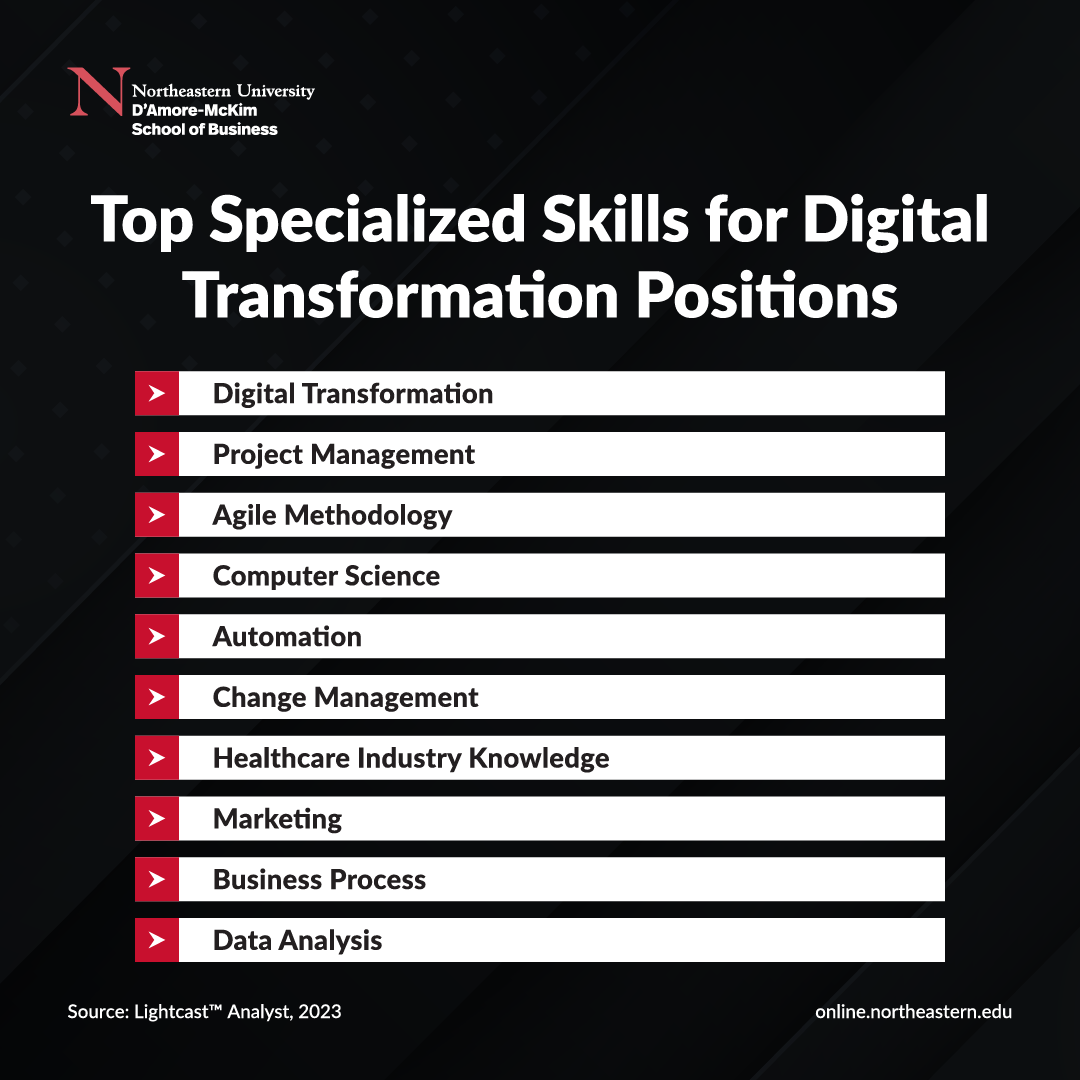Healthcare—like many other industries—is constantly evolving. With modern technologies and changing processes, healthcare management needs to search for new ways to meet the needs of their patients.
Digital transformation is an effective way to do this. While this term has become a catchall phrase, meaning something different to different people, digital transformation is critical to hospitals’ and healthcare facilities’ survival.
If you’re interested in this exciting field, here’s a closer look at what digital transformation really is, why it’s important in healthcare, and what challenges you can expect.
Ready to apply? Request an application fee waiver
What Is Digital Transformation in Healthcare?
Digital transformation in healthcare refers to the comprehensive integration of digital technologies, data analytics, and innovative processes to enhance the delivery of healthcare services.
Some key components of digital transformation in healthcare include:
- Telemedicine
- Electronic health records (EHR)
- Data analytics
- Wearable devices
- Artificial intelligence
Although these components play an important role in the digital transformation of healthcare, much more than implementation of new technology is required. Instead, it’s an organizational strategy that digitally transforms administrative and clinical processes to make providers more productive and more engaged with patients.
“Ultimately, digital transformation in healthcare is creating a culture of innovation and change,” says Mandeep Maini, Northeastern MBA alum and mentor at Northeastern University’s National Science Foundation Innovation Corps.
To do this, healthcare facilities need professionals with a business or management background to lead these transformative initiatives along with technology specialists. According to our analysis of job postings data there’s been a 35.5 percent growth in health management careers from 2017 to 2022.
If you’re a current or aspiring healthcare manager, embracing digital transformation in healthcare is essential to your success in the field. Here are just a few benefits you can expect from implementing this ideology at your organization.

4 Benefits of Digital Transformation in Healthcare
1. Personalized Patient Care
Improving the quality of care is one of the top objectives of healthcare professionals. However, this doesn’t always require improvements to its delivery. Instead, it involves providing personalized care that meets the specific needs of individual patients.
For example, technology like electronic health records allows physicians to create tailored treatments based on patient-specific data like medical histories and genetic profiles. By leveraging this data, healthcare professionals can personalize treatment plans, predict potential health risks, and prescribe interventions that are specifically tailored to each patient’s unique needs.
While the use of electronic health records alone doesn’t mean your organization is embracing digital transformation, learning how to create a more personalized approach to patient care with these tools can create a more efficient healthcare delivery system that effectively leverages today’s technologies.
2. Health Equity and Increased Access
Health equity—having fair opportunities to attain the highest level of health—is an important topic in all aspects of healthcare today. According to the Kaiser Family Foundation, Black, Hispanic, and Asian adults in the US were less likely to receive mental health services in 2021 compared to White adults.
However, digital transformation in healthcare aims to improve this disparity in healthcare accessibility through telemedicine—making remote monitoring possible in disciplines like behavioral health, psychiatry, and chronic diseases.
“It allows doctors to provide care at the most optimal location that’s beneficial to the patient, the clinician, and even the insurer who’s paying for the care,” Maini says.
As a result, patients who have historically been underserved, such as rural and elderly patients, now have the opportunity to access health services through healthcare apps and other digital tools.
3. Increased Productivity
Productivity in healthcare is important. It ensures individuals receive care in a timely manner and clinicians treat as many patients as possible. However, with the aging population outnumbering its youth counterparts and the healthcare labor shortage, facilities are having a harder time keeping up with the demand.
This is where digital transformation technologies like AI-based automation can help.
Automation in the healthcare system can significantly enhance efficiency in various healthcare administration tasks like:
- Streamlining appointment scheduling
- Ensuring compliance with health care laws and regulations
- Coordinating work schedules for care providers and other employees
- Maintaining patient medical records
- Automating notes and claims processing
While most automation in healthcare is leveraged in administrative tasks, clinicians are also saving precious time with these types of technologies.
“Technology is being used in every single aspect of healthcare,” Maini says.
For example, doctors can benefit from transcription technology that allows them to speak into a microphone and transcribe their notes for electronic health records. They can also leverage artificial intelligence to more efficiently predict potential health issues for individual patients or communities.
“As long as historical health data is comprehensive, clinicians can more effectively predict potential health issues based on certain symptoms,” Maini says.
With this information doctors are more productive in slowing the progression of chronic disease and improving the health outcomes of patients.
4. Cost- Efficiency
Making healthcare more affordable is top of mind for most patients—especially in the United States. According to the Peterson Foundation, the U.S. has one of the highest costs of healthcare in the world, spending $4.5 trillion in 2022—averaging around $13,493 per person. By comparison, average healthcare costs in other countries are less than half as much.
As a result, healthcare professionals leveraging technology are able to implement value-based care—which focuses on quality care, provider performance, and patients’ overall experience.
“The premise of value-based care is that we don’t just want to pay for service if it’s not improving health outcomes,” Maini says.
According to Maini, value-based care is focused on the industry’s main objectives of improving patient outcomes with cost-effective care. This is achieved through data collection and analysis in healthcare administration. For example, the emergence of community health clinics is one healthcare solution that has led to more timely care for many patients compared to emergency rooms.
This ensures patients are only going to the doctor when it’s essential to the patient’s health and avoiding costly visits to the emergency room—which can cost up to $1,300 per visit.
Top Challenges to Digital Transformation in Healthcare
While technology has provided numerous benefits to the healthcare system, digital transformation initiatives can also present new challenges that need to be addressed to ensure long-term success. Here are just a few obstacles that you should be aware of if you’re hoping to create a culture of digital transformation and innovation at your organization.
Data Privacy and Security
Perhaps the most well-known challenge of moving healthcare into the digital age is the concern around data privacy and security.
“Currently, your digital health data lives in silos,” Maini says. “It’s in your electronic health record. It’s with your pharmacist. It’s with your radiologist or even your dentist. But these systems don’t talk to each other.”
This lack of data interoperability has made it hard for hospitals to use healthcare data in a way that provides timely access to information that can optimize patient care and health outcomes. To fix this, however, healthcare facilities need to consolidate data in the cloud and reduce redundancy. This will streamline processes and reduce costs.
Another challenge is data security. While digitizing data is easier to share with patients and their providers or specialists, it’s also easier to hack.
According to the HIPAA Journal, between 2009 and 2022, over 5,000 healthcare data breaches were reported to the HHS’ Office of Civil Rights which resulted in the disclosure of over 350 million healthcare records.
As a result, hospitals and healthcare facilities need to strengthen cybersecurity to reduce risk of data breaches. They also need to meet patient expectations while also complying with data protection regulations.
According to Business Wire 92 percent of Americans say it’s important to have quick, easy access to their medical records through digital patient portals. As a result, hospitals need to strengthen cybersecurity while allowing patients to access their data.
Resistance to Change
Resistance to change in the workplace is a common obstacle for most managers. However, digital transformation in healthcare requires significant buy-in from clinicians, administrators, and patients.
According to Maini, a good way to ensure all stakeholders are on the same page for digital transformation is creating an organizational structure that promotes collaboration.
“When I talk to hospitals about getting ready for digital transformation initiatives like cloud migration or cybersecurity, my advice is to create cross-functional teams,” Maini says.
This means health facilities shouldn’t instruct business professionals to look for technology solutions and doctors to focus on clinical solutions. Instead, they should work together to identify and implement solutions that meet the needs of all stakeholders.
“This ensures the technology has a clinical and administrative function,” Maini continues. “If healthcare providers who are meant to use the technology aren’t on board, they likely won’t let the project succeed.”
Skill Gaps Among Healthcare Professionals
In addition to labor shortages, healthcare is also facing challenges around a significant skills gap in both new and seasoned professionals in the field. This is particularly true for clinicians who aren’t trained in various digital tools that are new to the healthcare sector.
This means hospitals need better professional development opportunities and training programs for healthcare professionals looking to remain effective in digital healthcare.
According to our analysis of job postings data, common skills healthcare professionals need to succeed at facilities that implemented digital transformation initiatives include:
- Digital Transformation
- Project Management
- Agile Methodology
- Computer Science
- Automation
- Change Management
- Healthcare Industry Knowledge
- Marketing
- Business Process
- Data Analysis

Considering the shifts in the industry, additional skills that can be incredibly useful in healthcare are artificial intelligence and cybersecurity. And while many of these skills aren’t directly related to clinical work, the skill requirements of jobs like nursing will likely evolve.
“Many people fear that AI in healthcare will eliminate the need for nurses,” Maini says. “But that’s not true at all. In fact the role of nurses will become more valued since their role won’t just focus on providing care, it will also ensure diagnostic predictions from AI systems are correct.”
Become a Leader in Digital Transformation
While there’s excitement around what these technologies can offer the healthcare sector, there’s still a considerable skills and knowledge gap of professionals in the field.
“There’s a large number of jobs that are going to be created because of these technologies,” Maini says. “And we need hospitals and healthcare organizations to prioritize training and upskilling in these fields.”
If your organization doesn’t have adequate professional development opportunities, one of the best ways to learn about digital transformation in healthcare is earning a master’s degree in healthcare management.

According to our analysis of job posting data, almost one-third of job postings related to digital healthcare prefer candidates with a master’s degree. An online master’s program, like Northeastern’s Online MS in Management: Digital Transformation in Healthcare, can offer you the flexibility needed to continue working while learning how to become a more effective leader in healthcare.
“It’s important to be open to technology and a lifetime of learning,” Maini says. “Technology is changing very rapidly and it will continue to change over time.”
If you want to know more about how this degree can jumpstart your career, contact an admissions counselor to find out what the program has to offer.





